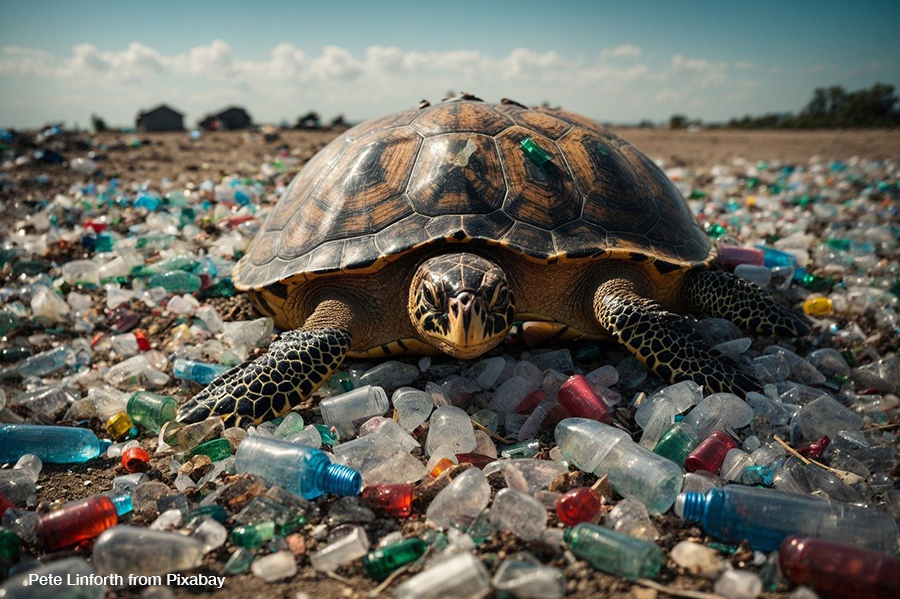
Keeping pets cool in the summer is an important priority since they can easily overheat through a thick layer of fur. (Courtesy photo)
Summer brings with it an expectation of sweltering temperatures, sometimes to the point of danger.
As temperatures climb, remember that if you are hot, your pet is probably feeling even hotter. Dogs and cats generate more heat than people and usually also have a thick layer of fur to trap that heat inside.
Dr. Christine Rutter, a clinical assistant professor at the Texas A&M College of Veterinary Medicine & Biomedical Sciences, has some tips on identifying signs that your pet may be too hot and suggestions on ways to keep them safe and cool on hot summer days.
While people sweat all over to get rid of excess heat, dogs and cats are only able to sweat through their paw pads.
Most pets rely on panting to cool down, but animals with shorter noses, like Bulldogs and Persian cats, tend to be less heat tolerant, meaning they have a harder time getting rid of excess body heat.
“Very young and older animals, especially those with underlying conditions, are also less heat tolerant than healthy adult animals,” Rutter said. “If you hear snoring, coughing, or gurgling when your pet tries to pant or gets excited, it’s not going to be heat tolerant.”
Factors such as obesity, long hair, and medications can also make pets more sensitive to heat. If any of these apply to your pet, Rutter advises talking to a veterinarian about increased heat sensitivity.
Luckily, there are many things people can do to help their pets cool down on hot days. The simplest solution is to keep pets inside an air-conditioned building, but there are other options if the pet will be spending time outside.
“Shade, cool water to drink or play in, a fan, and a cool surface such as grass help pets cool down–just like how we seek out a glass of lemonade, a shady spot to rest, and a breeze when we are too hot,” Rutter said.
Cats usually limit their own activity and seek out shade if they get too hot but should still be provided a fresh source of water and should be not be put outside for the first time during the summer.
Working, agility, and motivated dogs, like retrievers or game dogs, however, may not slow down when they get too hot, so owners should be mindful to limit their activity as the temperature rises, according to Rutter.
“Any dog that wants to take a break, doesn’t want to walk, or is panting heavily should be given fresh, cool water and a shady spot to rest until their breathing normalizes and they want to return to activity,” Rutter said. “Avoid exercise during the heat of the day and take a 10- to 15-minute break to cool down every 15 to 20 minutes when the temperature is over 80 degrees.”
If an animal cannot get rid of excess heat, it may develop heat exhaustion or heat stroke; environmental temperature, humidity, and the pet’s activity level can all play a role in developing these conditions.
“Heat exhaustion is the feeling of lethargy, discomfort, or weakness that is experienced when the body gets too hot,” Rutter said. “It’s the body’s way of saying, ‘slow down!’”
In comparison, heat stroke is an illness caused by increased body temperature. According to Rutter, it is much more serious and can even be life-threatening if not caught early.
If a pet is showing signs of heat exhaustion, it should be wet down with cool (not cold) water and be put near a blowing fan in a shaded, air-conditioned area.
If the pet vomits, acts lethargic, has red gums, or seems to have small, red bruises on its mouth, eyes, or abdomen it should be taken to a veterinarian as soon as possible. If you are unsure of whether it is an emergency situation, it is better to have the pet checked out just in case, because heat stroke can cause serious damage very quickly.
Rutter also reminds pet owners that it is dangerous to leave a pet inside a parked car during any time of the year, but especially during the summer; in as little as 15 minutes, the inside of a car can become lethally hot.
The best way to avoid heat exhaustion and heat stroke is to be aware of the amount of time a pet spends outside in the summer and to watch for any symptoms of these conditions. With these simple precautions, pet owners can ensure that their dogs and cats stay safe during the worst of summer.
Pet Talk is a service of the College of Veterinary Medicine & Biomedical Sciences, Texas A&M University. Stories can be viewed on the web at vetmed.tamu.edu/news/pet-talk. Suggestions for future topics may be directed to [email protected].
For more stories like this subscribe in print or online.
















0 Comments